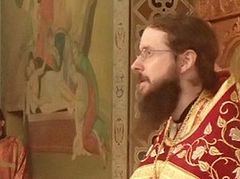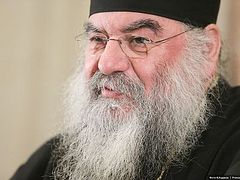“He Will Exalt the Humble and Meek”
There is an interesting historical pattern that has been repeated any number of times across the centuries. A group of the dispossessed and the poor come together within a religious movement. What begins with great enthusiasm succeeds. As it succeeds, those who were once poor and dispossessed manage to gather themselves into some sort of order. They learn to work hard, to avoid disaster, to become better, more moral people. Often this change takes place as those within the community sacrifice to make the same transition possible for others. And then success takes over.
Those who once were poor are now prosperous. Association with the poor now feels risky, almost a step backwards. The rewards of morality create a new class of Christians who feel distinctly uncomfortable around the very sort of people who once constituted their membership. In economic terms, it is a movement from poverty towards some form of propertied stability. With the new stability comes a whole new worldview.
The shift in worldview is significant. Morality (good behavior) has a way of self-justification. The morally competent all-too-frequently see themselves as the products of their own self-discipline and inner character. They fail to see that they are doing little more than conforming to the social morality of their class.
I was born to the middle class (lower). Along with that came a deep sense of right and wrong, of work and responsibility. My parents came from poor circumstances – my father was the son of a sharecropper, my mother, the daughter of a farmer (100 acres). We had little to mark us out as “middle class.” What I actually received was a deeply internalized sense that the middle class was where we belonged.
My mother would occasionally inveigh a shameful imprecation on us. Words or actions would bring this ringing rebuke: “They will think you’re some of Uncle Pick’s people!” I never knew who “Uncle Pick” was, or what his people had done. However, it sounded like the worst possible thing.
As an adult, I eventually queried my mother, expecting to hear the tale of some terrible faux pas, an out-of-wedlock child or such. Instead, I heard something very different. “They never wanted to better themselves.” This was her dismissal of these ne’er-do-well scions of our family tree. It didn’t matter how poor you were so long as you didn’t act like it. Indeed, being middle class requires a consciousness of not being something else.
Christ’s most damning words were reserved for the Pharisees. He uses the term “hypocrites” 14 times in referring to them. He does not fault their “morality.”
“The scribes and the Pharisees sit in Moses’ seat. Therefore whatever they tell you to observe, that observe and do, but do not do according to their works; for they say, and do not do. (Mat 23:2-3)
He consistently makes a distinction between their outer actions and the inner disposition of their hearts:
Woe to you, scribes and Pharisees, hypocrites! For you are like whitewashed tombs which indeed appear beautiful outwardly, but inside are full of dead men’s bones and all uncleanness. Even so you also outwardly appear righteous to men, but inside you are full of hypocrisy and lawlessness. (Mat 23:27-28)
The Pharisees were religiously and morally successful. Their children were likely the same. And yet, inwardly, they were failing. I recently saw a description of my writing in which it was characterized as marked by “existential despair” and “moral futility.” This assessment (which makes me sound like Dostoevsky!) seemed to have been occasioned by my treatment of certain notions of “morality.” Cf. My series on the “Unmoral Christian.”
I have never suggested that anyone should be immoral or amoral. Readers here will know that my commitment to the Church’s teaching is unequivocal. However, I share the concern found in Christ’s approach to the Pharisees. The nature of sin can be easily overlooked in a “merely” moral approach to the Christian life. The “dead men’s bones” that lie beneath the moral surface were obvious to Christ. “We do not have a legal problem,” I have written, “We have a death problem.” “Dead men’s bones” are the result of the ontological corruption that is the very heart of sin. And the deepest and most corrupt sinners among us can also appear to be the most moral. If the morality of your life does not reach beneath the surface and into the depths of the corruption that is at work there, then your life is indeed an expression of moral futility.
An equally great tragedy rises from this untended inner corruption. The assurance of moral rectitude is fortified by the unwillingness to rightly acknowledge and bear the inward shame of sin. This dries up the well of compassion that should mark the soul. A gulf grows between the “morally” competent and those who are clearly and visibly broken by sin. True compassion would require the recognition of a kinship of shame.
A particular point in the criticisms I’ve received is worth noting. Some have said that I teach that there is no moral progress in this life – that we cannot get better. That is close to something that I have indeed said. I should acknowledge that this a hyperbole on my part. Obviously, the saints are living examples of people who have gone from the worst to the greatest. It is possible to imagine that others can do something similar. I have observed (and said) that it is rare. What is common, I think, is an improvement of behavior, a greater conformity to rules (and this is not a bad thing). But it just as often leaves unattended the “dead men’s bones” of ontological corruption and shame.
If, for example, anger is a common element in your life, then it is pretty much the case that there are areas of unattended shame. It is also true that these same wounds will continue to provide the fuel for a host of sins across a lifetime. One thing that separates the traditional middle class in our culture from the lower classes is the adherence to a standard of public behavior. Those in the poorer classes are more likely to misbehave publicly in an embarrassing manner (yelling, cursing, etc.). But the nice banker walking down the street is no less angry. His anger remains unexpressed (except at home in more private places). We can say that the banker is more “moral” than the poor man, but he is just as sick and broken.
My writing has an intention of addressing this hidden brokenness. There are already plenty of people who write and pontificate about what constitutes morally correct behavior. I want to attend to what actually causes the corruption in our life. When you strip away the veneer of public morality, you reveal a world of moral futility. If anyone doubts this to be the case I beg them to pay attention to the world in which they live. The chaos and evil that we see belongs to hearts that are just like mine and yours. If everyone in the world were as good as me, then, I fear, we would see nothing that we do not already see.
This is the cry of a mature Apostle, “O wretched man that I am! Who shall deliver me from this body of death?” (Romans 7:21)
It is only when the veneer is peeled back and we dare to peer into the depths of shame that the Light can begin to overcome the darkness. The darkness cannot be managed – what it hides must be transformed. This deep inner world is the furnace in which the holiness of saints is forged. It is the place of true repentance.
In the meantime – and here I must be emphatic – we must be kind and gentle and exceedingly patient with one another. The true spiritual battle in the depths of the soul cannot be forced or browbeat into existence. It requires a trusting confidence and divine empathy to enter such a place. My writing, in its efforts to reveal our moral futility, is undertaken to create for many, a faith that it is possible to find grace and forgiveness with God and support in the struggle towards salvation. God is not our enemy. He entered the depths of hell (moral futility writ large) to free us. He came so that no darkness would be immune to His light.
I suspect that anyone who has “stared into the abyss” (to use the Elder Sophrony’s words) would not lightly inveigh on the benefits of morality. My mother worried that we would be taken for “Uncle Pick’s People.” I suspect that it is only when we see that we are all “Uncle Pick’s People” that the light of Christ can work the transfiguration that is the life of grace.
We can grow and we can change. But the change is constituted by becoming light, not by becoming well-behaved darkness.





May I use post this lamazing blog on my church’s app upper room media?